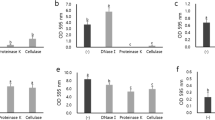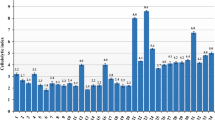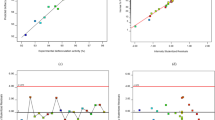Abstract
CHEMICAL activites of bacteria are affected by a number of environmental variables, among which pH, substrate concentration and temperature are the most important. If around a particle of a resin there are ionic layers deep enough to cover any bacterial cells adsorbed on the resin, one would not expect that the dependence of an activity of the cells on pH and substrate concentration will be the same for the adsorbed cells as for the cells freely suspended in solution, as McLaren has pointed out in the case of enzymes1.
This is a preview of subscription content, access via your institution
Access options
Subscribe to this journal
Receive 51 print issues and online access
$199.00 per year
only $3.90 per issue
Buy this article
- Purchase on Springer Link
- Instant access to full article PDF
Prices may be subject to local taxes which are calculated during checkout
Similar content being viewed by others
References
McLaren, A. D., Science, 125, 697 (1957).
Hattori, T., and Furusaka, C., Biochim. Biophys. Acta, 31, 581 (1959).
Author information
Authors and Affiliations
Rights and permissions
About this article
Cite this article
HATTORI, T., FURUSAKA, C. Chemical Activities of E. coli Adsorbed on a Resin, ‘Dowex-I’. Nature 184, 1566–1567 (1959). https://doi.org/10.1038/1841566a0
Issue Date:
DOI: https://doi.org/10.1038/1841566a0
Comments
By submitting a comment you agree to abide by our Terms and Community Guidelines. If you find something abusive or that does not comply with our terms or guidelines please flag it as inappropriate.



